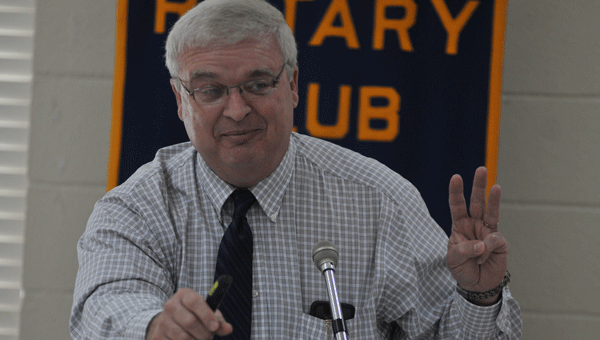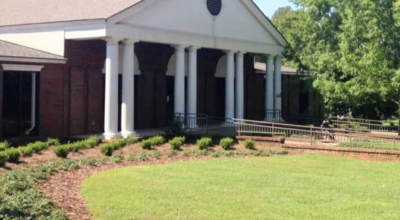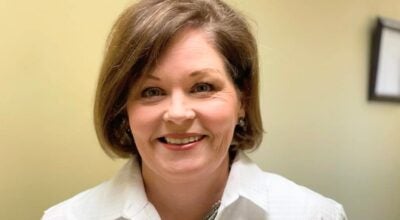Hope Afield program aims to help at-risk youth
Published 5:25 pm Friday, July 21, 2017

- Ken Kilpatrick, founder of Hope Afield, detailed his plans to aid local at-risk youth by offering them hope, healing and purpose through the great outdoors.
For more than two decades, Ken Kilpatrick’s life’s work has been to help at-risk children in the Montgomery area to overcome a number of environmental hurdles.
With his latest project, he’s looking to offer youth in Butler County and surrounding areas a literal and metaphorical breath of fresh air.
Kilpatrick detailed his Hope Afield program as Second Judicial Circuit judge Terri Bozeman Lovell’s special guest at Thursday’s Rotary meeting.
Hope Afield seeks to bring the great outdoors to children in an effort to give them hope, healing and purpose.
Lovell introduced Kilpatrick to a large crowd of Rotarians and special guests, noting is numerous accomplishments in Montgomery’s inner-city areas.
“Our mission as Rotarians is to make a difference, and I think we all need to listen to what [Kilpatrick] has to say, because we are indicative of what happens in our community,” Lovell said.
“If we are willing to get involved and do something—if you saw the news, you saw where the police department said we had some issues with some of the juvenile crime going on, but that’s always been an issue in Greenville. But we need to be accountable—if we’re not doing what we need to do as a community to address that issue, then we need to step up and do what we need to do.”
Lovell also invited Greenville mayor Dexter McLendon, Greenville Police Department acting chief Anthony Barganier and Butler County Schools superintendent John Strycker, and his wife, Deborah.
“I want them to hear what we’re trying to do to improve on this issue,” Lovell continued.
“People are really involved in what he’s doing, and he has decided to come to Butler County and do a similar program. And I’m so excited about what he has to tell you today.”
Kilpatrick offered background by detailing his previous program, Compassion 21, which began serving youth in the Montgomery area in 1994.
Breaking the cycle of hopelessness was—and remains—the program’s chief goal.
Compassion 21 does so with a series of learning centers that operated in government housing communities and other low-income areas.
It also instituted a mentoring program, and built a warehouse for the purpose of collecting and distributing food to needy families. Just last year, the program distributed more than 186,000 pounds of food. About 400 people are served each month.
His approach in Butler County is notably different, however.
“A number of years ago, God blessed us with a 115-acre farm here in Butler County, and we were unable to develop anything at that time because we are developing Compassion 21,” Kilpatrick said. “But I’ve recently resigned as executive director, and our house is for sale. We will be moving back to Butler County to the farm. What we’re wanting to do is use that property to help work with underprivileged kids and their caregivers.”
The outdoors, he said, promotes lifelong physical, emotional and spiritual well-being for youth, and a growing number of studies would suggest that contact with nature is as important to children as good nutrition or adequate sleep.
“It’s about having an outdoor classroom and talking to kids about life skills or general character skill issues,” he continued. “It’s about using livestock to teach respect, responsibility and character.
“A lot of the kids, particularly kids raised in government housing communities, have never seen the stars at night because they live under mercury vapor lights. But you get them out in the country where there are no lights, and it’s an amazing impact on a child to experience that.”
The program is seeking to offer children experiences beyond their communities, such as trips to rodeos and baseball games. Ultimately, Kilpatrick said that the act of spending time itself was more important than how one chose to do it.
“In my opinion, there is not anything that’s going to take place with spending time with a child,” he said. “I think that’s part of the problem—there aren’t enough caring adults spending time with children, and they’re left at home for the TVs to raise them. And that’s dangerous.”
Hope Afield is seeking qualified volunteers and people with a passion for working with at-risk children and their caregivers. The program is also seeking local board members and, of course, at-risk youth to serve.
On Aug. 24, there will be a fundraiser held at LBW Community College’s Wendell Mitchell Center beginning at 6:30 p.m.
Though there won’t be ticket sales, Kilpatrick is seeking table hosts, who will be responsible for finding eight people willing to help fund the program.
“So it’s not just a free meal—it’s a benefit dinner,” he said.
“I tell people we don’t charge you to get in, but you’re going to have to pay to get out,” he added with a sly grin.
Strycker extended Kilpatrick an offer to help, as well as an invite to the opening day of school.
“What you’re talking about is in lockstep with the vision I have for this community,” Strycker said to Kilpatrick. “Because I truly feel that if young people are hungry, if they don’t feel safe or if they don’t have a sense of belonging, academics are very secondary.
“I think God’s at work here in this community. I don’t think it’s a coincidence that we’re in exact lockstep.”





